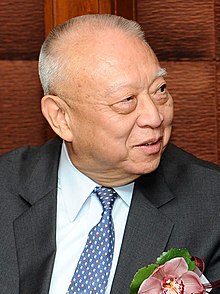Background
Tung Chee-hwa was born on May 29, 1937 in Shanghai. He is known as Dong Jianhua or better known as Tung Chee Hwa, was the first child of Tung Chao Yung and Koo Lee Ching.


Tung Chee-hwa was born on May 29, 1937 in Shanghai. He is known as Dong Jianhua or better known as Tung Chee Hwa, was the first child of Tung Chao Yung and Koo Lee Ching.
Tung Chee Hwa received his secondary education in Hong Kong, and continued university education in England. In 1960, he graduated from the University of Liverpool with a Bachelor of Science degree in marine engineering.
He then worked at General Electric in the United States. In 1969, he returned to Hong Kong and entered the family business. Gradually, Tung Chee Hwa took over the leadership of the family enterprise, the Orient Overseas (International) Limited (OOIL). In 1982, his father died. There were rumors that China helped Tung's company when it encountered serious financial difficulties in the 1980s.
In control of a shipping enterprise, Tung Chee Hwa had multiple connections. As a Shanghainese, he was well acquainted with President Jiang Zemin, who headed the Beijing government, and spoke with the latter in their local dialect. Tung also took advantage of his father's connections in Taiwan. He was active in influential circles overseas, and among his friends were former American President George Bush and Assistant Secretary of State Winston Lord. From 1983 to 1997, he was international councillor of the Center for Strategic and International Studies in Washington, DC. From 1995 to 1997, he was adviser to the Institute for International Studies of Stanford University in California and the Council on Foreign Relations in New York. In Hong Kong, he maintained a low profile in politics. The media knew very little about him until 1996, even though he had served at the executive council of the British Hong Kong Government from 1992 to 1996 and the Basic Law Consultative Committee from 1985 to 1990.
In January 1996, Jiang Zemin met with members of the National People's Congress (NPC) Preparatory Committee for the establishment of the Special Administrative Region (SAR) in the Great Hall of the People. When he was about to leave the room, he suddenly approached Tung Chee Hwa in the front row and shook hands with him. From then on, the Hong Kong media speculated that Beijing had chosen Tung to be the chief executive, and the fifty-nine-year-old shipping magnate received growing attention. The subsequent developments seemed to confirm the speculation resulting from this famous handshaking incident. In his election campaign, Tung employed three “isms” to explain his vision for Hong Kong, namely Confucianism, elitism, and nationalism. In 1996, the media described the process as ttthe selection of the chief executive” rather than “his election as the 400-person selection committee was responsible for casting the votes. An official candidate of the election needs to secure at least 50 votes from the selection committee to be considered nominated for the post. When Tung obtained 206 votes on November 15, he emerged as the winner even before the chief executive election on December 11. As expected, he got an overwhelming majority of votes of 320 on the day of election, and beat his opponents Sir Yang Ti-liang (42 votes) and Peter Woo (36 votes).
Tung Chee Hwa was able to enjoy public consent for a short period after the election. In an opinion poll released on election day, it recorded a 70% approval rating for Tung. Nevertheless, his popularity was short lived and soon faced serious setbacks. Even before the handover on July 1, 1997, the chief executive designate faced the problems of the legality of the provisional legislature, the revision of civil liberties law, and his relations with key government officials. When Hong Kong suffered from the effect of the Asian financial crisis in late 1997, the approval ratings for Tung continued to drop. In late 1998, less than one half of the respondents to an opinion poll believed that Tung had the ability to solve Hong Kong's economic problems. During his administration, he always had plans to reshuffle his team of top government officials, and laid his hands on every aspect of government reform. The SAR government was an executive-led administration, and Tung relied on his executive council members. Throughout the years, Hong Kong debated about education and civil service reforms, the close relations between big business and the government, and the vulnerable real estate market. In his annual policy addresses, Tung emphasized that the local economy should transform and concentrate on the development of information technology. He also raised the concerns of environmental pollution and the improvement of the tourist industry. He was elected to a second term in 2002.
